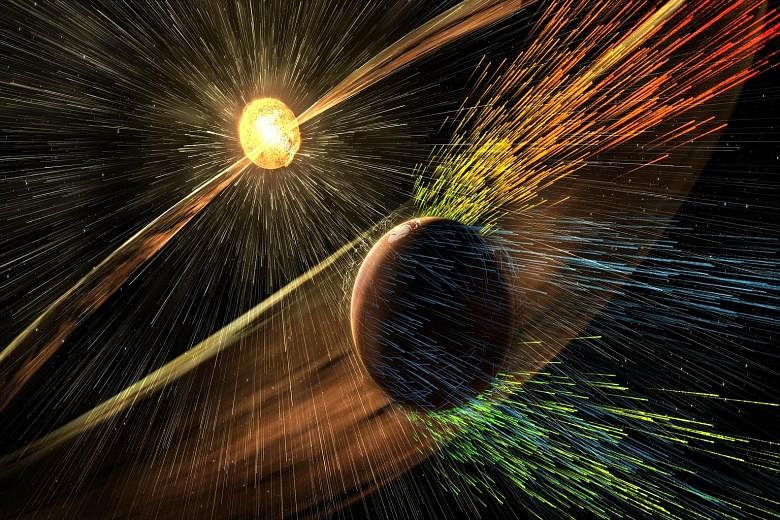CAPE CANAVERAL (Florida) • Mars may once have supported life but is now cold and dry, and scientists said that a stormy sun likely accelerated the loss of the Red Planet's atmosphere.
In fact, researchers believe the thick, protective atmosphere that allowed ancient Mars to be warm and wet billions of years ago may have disappeared far earlier than previously thought.
"Like the theft of a few coins from a cash register every day, the loss becomes significant over time," said Mr Bruce Jakosky, principal investigator on the Maven mission at the University of Colorado, Boulder. "We've seen that the atmospheric erosion increases significantly during solar storms, so we think the loss rate was much higher billions of years ago when the Sun was young and more active."
The air on Mars - what there is of it - is leaking away, about 230g per second sputtering into space, scientists announced on Thursday. The planet's early atmosphere is thought to have been as thick as or thicker than Earth's today, and even over the 4.5-billion-year history of the solar system, that slow leak would not explain how it atrophied to its current wisps.
Data from Maven, an unmanned spacecraft that has been circling Mars for the past year, was published in scientific studies, including four in the journal Science and 44 more in Geophysical Research Letters.
Instruments aboard the spacecraft are measuring ions in the upper atmosphere of Mars and are also keeping track of solar wind to help understand what influences the escape of gas into space.
"What we are finding is that the rate of loss out the top is relatively slow today, maybe only about 100g per second globally, but over time that can be a significant loss," Mr Jakosky said. "And we think that is the tip of the iceberg so to speak, that early in history the loss rates were much greater and that this mechanism could account for the loss of a very thick early atmosphere."
Maven, which stands for Mars Atmosphere and Volatile Evolution, was launched in 2013 and began orbiting the Red Planet in September 2014. Its goal is to help scientists understand one of the solar system's biggest mysteries - what happened to the water on Mars and the carbon dioxide in its atmosphere several billion years ago?
Mars today has a very thin atmosphere, less than 1 per cent as thick as Earth's.
Previous space missions using robotic rovers and orbiters have shown plenty of geological and geochemical evidence that climate change occurred on Mars.
But knowing more about what drove these changes could shed light on the potential for life on Mars, said Mr John Grunsfeld, associate administrator for the Nasa space agency's Science Mission Directorate in Washington.
"Mars appears to have had a thick atmosphere warm enough to support liquid water which is a key ingredient and medium for life as we currently know it," he said. "Understanding what happened to the Mars atmosphere will inform our knowledge of the dynamics and evolution of any planetary atmosphere."
Data from Maven helped to show what happened during a large solar storm in March, and indicated that this loss "increases dramatically during a solar storm event, when a coronal mass ejection hits Mars", Mr Jakosky said.
Mars, which is farther from the Sun than Earth, may have had a similar magnetic field once, but it was diminished when the planet's core froze.
Another report based on Maven data in the journal Science found that auroras are generated on Mars after solar storms, much as they are on Earth in a colourful phenomenon often called the Northern Lights.
AGENCE FRANCE-PRESSE, NEW YORK TIMES

